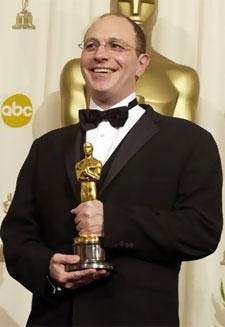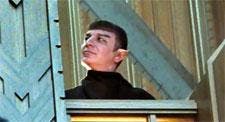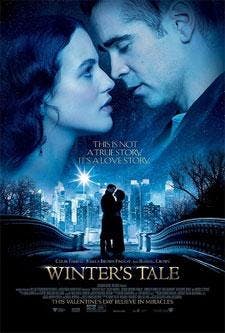Published Feb 12, 2014
Which Oscar-winning Writer Cameo-ed in Two Star Trek Films?
Which Oscar-winning Writer Cameo-ed in Two Star Trek Films?

Did you know that one of Hollywood’s most successful screenwriters, the winner of an Academy Award, no less, is a huge Star Trek fan?

Well, he is. And did you know that that same screenwriter – who is also a producer and now a film director, too – has appeared in not one, but two Star Trek features? Well, he has. He is Akiva Goldsman, the writer and/or producer of everything from Batman Forever, Practical Magic, A Beautiful Mind (for which he won his Oscar) and I, Robot to The Da Vinci Code, I Am Legend, Fringe and the upcoming fantastical love story, Winter’s Tale.
So what is Goldsman’s Star Trek connection, and why did he play a Vulcan Council Member in Star Trek (2009)and a Starfleet Admiral in Star Trek Into Darkness? There’s a hint to be found in that list of credits – Fringe, of course – but the story goes much deeper than that. StarTrek.com discovered as much when we spoke with Goldsman about Winter’s Tale, which he wrote, produced and directed, and which is set to open on Feb. 14. Here’s what he had to say about Trek and Winter’s Tale.
How big of a Star Trek fan are you?
GOLDSMAN: I am a dyed-in-the-wool, diehard, 1000-percent Trekkie, and I say Trekkie, not Trekker, and I don’t care what the nomenclature has become. I think my first Star Trek convention was at the Statler Hilton Hotel in 1977 or 1978. I grew up in Brooklyn, and what you saw (of Star Trek) was on WPIX, Channel 11, and you watched it at 7 every night. I’m not quite old enough, I don’t think, to ever remember having seen it in primetime. But I picked it up very quickly in syndication. I remember going to the Star Trek conventions to see the actual colors, because it was the first time we ever saw it projected. I remember seeing blooper reel for the first time. Also, our mothers let us get a room, which was absurd. This was in the days when you bought giant bags of pot, which were all seeds and stems, and rolled them on Goodbye Yellow Brick Road or Frampton Comes Alive.
So I loved the show. It was tied to early adolescent liberation, just personally. I’ve just been obsessed with it my whole life. I read all the David Gerrold books. I read the numbered, short-story-ilizations of all the episodes. I read all the Harlan Ellison “City on the Edge of Forever” nonsense. I was just that kid. And I lived for the resurrection of the property. I was in college when Star Trek: The Motion Picture came out. I was in love with Persis Khambatta, bald or not. I sort of thought, “Well, that’s too bad (about TMP),” and then Wrath of Khan happened, and it was the second coming for everybody. So I just loved it. I’ve seen every episode of every show, except the digitally remastered ones, just because I haven’t.
And somewhere along the way, you became friends with J.J. Abrams…
GOLDSMAN: I introduced J.J. to his wife. I did Fringe. And so when he was doing the first Star Trek, I basically begged. That went OK, so then I guess it was maybe just a good idea to bring whatever folks from the first one back in (for the second one). I might have begged some more. And there I was. I couldn’t love it more. I have a bubblegum card right here in my office of me in the Vulcan council.
Did you have a nerdgasm when they put your Vulcan ears on?

Winter’s Tale is based on the book of the same name. It’s a 700-page tome that you had to whittle down and adapt into a two-hour movie. What do you feel is the emotional spine of the story?
GOLDSMAN: The novel is complex and all beautiful, beautiful elbows, all jutting out of the sack. But, for me, the spine of it is the Peter Lake/Beverly love story. It exists in the same way in the movie as it exists in the books, but in the book it’s a big chuck, then it goes away for 300 pages with a different character named Hardesty Maratta, who managed to make his way into one scene of the screenplay in one draft. Then the book comes back to Peter and his yearning for the memory of Beverly. So the love story was the part I always found most evocative. And I also love the story’s genre, magical realism, which is a strange thing to say because magical realism is almost not a genre in American movies. But I love it. I’ve loved reading it in literature and I love watching in movies.
Colin Farrell gives one of his best performances to date. How did you know he had it in him?

GOLDSMAN: I’m an admirer of Colin and have been since Tigerland, which is full of color and complexity, as is In Bruges. These are layered, multifaceted creatures he’s playing in those two movies. I’d also met Colin when he got out here, when he was young. I think that I was the second meeting he had. I was a writer and trying to be a producer when I grew up. And he’s just the most open-hearted kid. He remains that. Colin is kind of all heart and yet there is a protective veneer around him. Part of it is how beautiful he is. He’s really handsome. And part of it is he has those very dark eyes that can either tell you a lot or tell you nothing at all, depending on what he wants to do with them. I thought, ‘Well, that’s really Peter Lake,’ who in the book is a thief with a heart of gold. Colin is roguish and beautiful.
You first read Mark Helprin’s book in 1983. You were adapting it and planning only to produce it when you’re wife passed away in 2010, and then you felt compelled to direct it. So, you’ve lived with this film for a long time. If you can be even remotely objective, how satisfied are you with the finished film?
GOLDSMAN: I have no idea. I am pleased to have done it. I am pleased for immensely personal reasons that I was given the opportunity to do it. I made the movie on a wing and a prayer and the favors of others. That really is true.
Was your wife as attached to the material as you were and, if so, what do you think she’d make of the film?
GOLDSMAN: I think she was more attached to my attachment of it. Whenever I think of her, I think of her kissing my head. So I hope that means she thinks it’s a job well done.
Are you a director now?
GOLDSMAN: I like it. It’s really challenging, but it’s really, really fun. Writing is still the hardest job and producing is, in some ways, the job that is the most learnable. So it’s a skill-based job, skills you can acquire, for the most part, unlike writing, which is talent, practice, just endless perseverance and good luck. Directing is complex, because it’s the management of this weird, oxymoronic notion of collaborative art. You have a lot of people who want to do good by the object and themselves and their singular vision, as they should have, and you are kind of the bus driver for this creative summer camp. You’re moving it forward, moving it forward, and it’s very interesting. It’s oddly not unlike moderately complex parenting.
Let’s go back to Star Trek one more time. If you beg your way into the third Star Trek film, what do you want to play?
GOLDSMAN: I think I might have died in both. So I probably have to come back as a Gorn or something.
